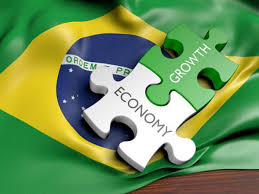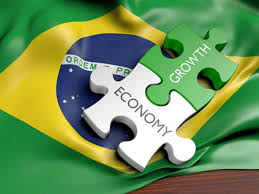
A contraction hit the Brazilian economy in the first quarter of the current year which is the first contraction for the economy since its recession in 2016. According to government data, the contraction was of 0.2 per cent in comparison to the last three months of 2018. However the year-on-year growth was 0.5 per cent.
This contraction comes at a time when the country’s president Jair Bolsonaro is being criticized for his efforts to revive the economy following a recession for two years.
There was a risk of another recession, economists said.
Brazilian economy, which was once considered to have huge growth potential, would go into recession again officially if there is a contraction in the second quarter also. It was just about three years ago that the country had encountered a two year period of recession - in 2015 and 2016, with the economy shrinking by almost 7 per cent.
While accepting that the contraction in the quarter was because of temporary factors, early signals indicate that the second quarter growth has also not been good, said William Jackson, chief emerging markets economist at Capital Economics.
"There is now a real risk that the economy will slip into a technical recession," Jackson said.
Considered to be among the most potential economies and a member of the BRICS economies – which stand for Brazil, Russia, India, China and South Africa, the Brazilian economy was believed to be able to surpass the developed economies in terms of growth by 2050.
While the contraction was in line with expectations it is an early indication of economic performance since Bolsonaro took power in January and appointed businessman Paulo Guedes as "super-minister" of the economy. There was a surge in Brazil's stock market and currency after the election of Jair Bolsonaro, which reflected the confidence of the markets in the government.
The economy minister of the government, businessman Paulo Guedes, was given a free hand to bring in economic reforms. However currently there are high levels of disappointment about the ability capacity of the government to manage the country’s economy.
It would not be before next year that any noteworthy signs of economic growth in Brazil would become visible, believe the market experts.
A fall in investment and decline industrial and agricultural output was noted in the first three months of the year. Jackson said that a 1.9 per cent drop in exports was also repoted partly because of reduced metal exports.
"This appears to be due to cuts in iron ore output following the Brumadinho dam tragedy," he said.
The breaking down of the embankment railings dam in Brumadinho broke caused the death of hundreds which turned out to the worst mining disaster in Brazil. The owner of the mine is Vale, which is the biggest producer of iron ore in the world.
According to Jackson, this sudden drop in the production of iron ore would only have a temporary impact on the Brazilian economy and he anticipates hat there would be growth in the second quarter.
(Sourec:www.bbc.com)
This contraction comes at a time when the country’s president Jair Bolsonaro is being criticized for his efforts to revive the economy following a recession for two years.
There was a risk of another recession, economists said.
Brazilian economy, which was once considered to have huge growth potential, would go into recession again officially if there is a contraction in the second quarter also. It was just about three years ago that the country had encountered a two year period of recession - in 2015 and 2016, with the economy shrinking by almost 7 per cent.
While accepting that the contraction in the quarter was because of temporary factors, early signals indicate that the second quarter growth has also not been good, said William Jackson, chief emerging markets economist at Capital Economics.
"There is now a real risk that the economy will slip into a technical recession," Jackson said.
Considered to be among the most potential economies and a member of the BRICS economies – which stand for Brazil, Russia, India, China and South Africa, the Brazilian economy was believed to be able to surpass the developed economies in terms of growth by 2050.
While the contraction was in line with expectations it is an early indication of economic performance since Bolsonaro took power in January and appointed businessman Paulo Guedes as "super-minister" of the economy. There was a surge in Brazil's stock market and currency after the election of Jair Bolsonaro, which reflected the confidence of the markets in the government.
The economy minister of the government, businessman Paulo Guedes, was given a free hand to bring in economic reforms. However currently there are high levels of disappointment about the ability capacity of the government to manage the country’s economy.
It would not be before next year that any noteworthy signs of economic growth in Brazil would become visible, believe the market experts.
A fall in investment and decline industrial and agricultural output was noted in the first three months of the year. Jackson said that a 1.9 per cent drop in exports was also repoted partly because of reduced metal exports.
"This appears to be due to cuts in iron ore output following the Brumadinho dam tragedy," he said.
The breaking down of the embankment railings dam in Brumadinho broke caused the death of hundreds which turned out to the worst mining disaster in Brazil. The owner of the mine is Vale, which is the biggest producer of iron ore in the world.
According to Jackson, this sudden drop in the production of iron ore would only have a temporary impact on the Brazilian economy and he anticipates hat there would be growth in the second quarter.
(Sourec:www.bbc.com)





